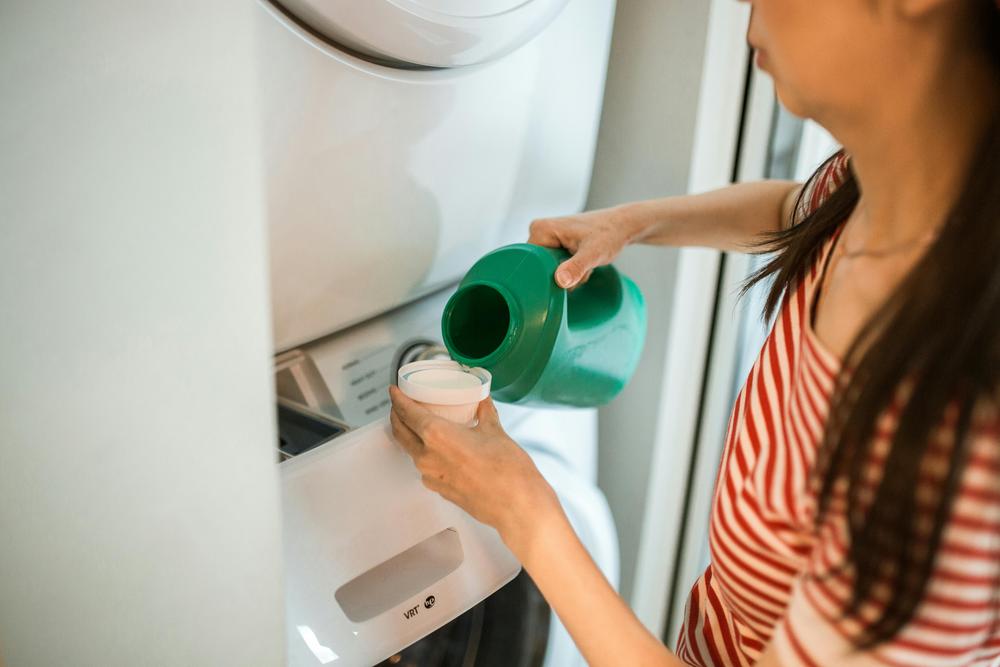Have you ever wondered what does a detergent do? Laundry is a fundamental part of our daily routine, yet many are unaware of the role detergents play in the process.
Detergents remove dirt, stains, and grease from a variety of surfaces. With the help of surfactants, enzymes, and other active ingredients, they break down and dissolve tough dirt to remove stains.
In this article, we'll delve into the world of laundry detergents, exploring their functions, ingredients, and impact on both our clothes and the environment.
From understanding how detergents work to wondering “is laundry detergent toxic?”, we're here to provide comprehensive insights to help you make informed choices about your laundry care.
What this article covers:- What Are Detergents and How Do They Work?
- What's the Difference Between Detergents and Fabric Conditioners?
- How Does Laundry Detergent Clean Clothes?
- Basic Detergent Formulas
- What Effect Does Temperature Have?
- What Effect Do Detergents Have on the Environment?
- How to Select the Best Detergent
What Are Detergents and How Do They Work?
Detergents are like our trusty sidekicks in the laundry game. Unlike traditional soap, detergents contain surfactants that help break down dirt and grime without leaving behind that annoying residue.
These surfactants are molecules with both hydrophilic (water-attracting) and hydrophobic (water-repelling) properties, allowing them to interact with both water and oily substances.
This unique characteristic makes detergents highly effective in removing various types of stains from fabrics, whether it's grease, oil, or protein-based stains.
Detergents can also be formulated to include other cleaning agents, such as enzymes and bleach, which further enhances their stain-fighting capabilities!
Detergents are versatile and can be used for various cleaning purposes beyond laundry, including dishwashing, surface cleaning, and even personal hygiene products.
With their superior cleaning power and ability to tackle tough stains, it's no wonder that detergents have become indispensable in our daily cleaning routines. So, when it comes to soap vs detergent, it's clear that detergents offer a more efficient and versatile cleaning solution for modern households.
What's the Difference Between Detergents and Fabric Conditioners?
While detergents clean, fabric conditioners soften and freshen your clothes. They're like the dynamic duo of laundry day!
Detergents work hard to remove dirt, stains, and odours from your garments, ensuring they come out of the wash looking and smelling fresh. Fabric conditioners complement the cleaning process by adding softness and a delightful fragrance to your laundry, leaving your fabrics feeling luxuriously smooth and smelling divine.
At Dip, we understand the importance of both cleaning and caring for your clothes. That's why we've developed innovative laundry detergent sheets and fabric conditioner sheets that revolutionise your laundry routine.
Our laundry detergent sheets are ultra-concentrated and conveniently pre-measured, ensuring a mess-free and efficient cleaning experience. They dissolve quickly in water, penetrating deep into the fabric fibres to lift and remove tough stains.
Meanwhile, our fabric conditioner sheets are infused with a special formula to deliver unparalleled softness and long-lasting freshness to your garments.
With Dip's innovative range of products, you can trust that your laundry will receive the best care possible, ensuring it looks, feels, and smells its absolute best after every wash.
How Does Laundry Detergent Clean Clothes?
Detergents clean clothes by utilising a combination of surfactants, enzymes, and other active ingredients.
Enzymes, such as proteases and amylases, target specific types of stains, breaking down proteins, starches, and other organic matter.
Different detergent types clean clothes differently based on their formulations. Biological detergents, for example, contain enzymes that are effective against biological stains like grass.
Bio detergents use enzymes to break down stains into smaller, more soluble components, making them easier to wash away.

Basic Detergent Formulas
The basic formula of a typical detergent contains several key components that work together to effectively clean clothes.
At their core, detergents rely on surfactants. These can be either anionic, cationic, nonionic, or amphoteric, each with unique properties for different cleaning needs.
Detergents also often contain phosphates to help soften water and improve cleaning efficiency. However, due to environmental concerns, many modern detergents now use alternatives to phosphates, such as zeolites.
It's essential to note that some detergents may contain 1,4 dioxane, a byproduct of the manufacturing process, which can be harmful in high concentrations.
Surfactants
Surfactants are the secret sauce in detergents. They are versatile molecules with a unique structure that enables them to bridge the gap between water and oils or dirt, facilitating their removal during the washing process.
Picture them as tiny, molecular-sized magnets that attract both water and oily grime, effectively breaking down stubborn stains and allowing them to be rinsed away effortlessly. Without surfactants, achieving sparkling-clean laundry would be a much tougher task.
So, whether you're comparing laundry pods vs liquid in terms of cleaning performance or reaching for your favourite neutral detergent, surfactants remain the key ingredient across all kinds of detergents. They ensure your garments emerge from the wash cycle looking fresh and pristine.
Enzymes
If you've ever wondered “what is biological detergent”, the answer is in the enzymes!
Enzymes are another essential component of biological detergents, particularly those designed for laundry cleaning. They are biological catalysts that break down tough stains and organic matter.
Enzymes in laundry detergents help to break down the complex molecules of stains so that they become easier to remove during the washing process.
Based on our research, a key benefit of using enzymes in laundry detergents is their ability to effectively remove stains even at lower temperatures. As such, they reduce energy consumption during the washing process.
Enzymes also help to prevent the re-deposition of stains onto clothes, ensuring a more thorough and efficient cleaning!
As if that wasn't enough, enzymes are biodegradable and environmentally friendly. That's why we here at Dip use them in our eco-friendly laundry detergent sheets for better laundry results without negative environmental impact.

What Effect Does Temperature Have?
Temperature plays an important role in the effectiveness of laundry detergents. Higher temperatures can enhance the cleaning power of detergents by accelerating chemical reactions and increasing the solubility of stains and soils.
When water temperature rises, the molecules in both water and detergent become more energised. This allows them to penetrate fabrics more deeply and dissolve dirt and grime more effectively.
However, it's essential to strike a balance as excessively high temperatures can damage delicate fabrics and increase energy consumption.
Moreover, modern detergents are formulated to perform well even at lower temperatures, which not only saves energy but also helps preserve the integrity of clothing.
What Effect Do Detergents Have on the Environment?
As advocates for sustainability, we at Dip recognize the significant impact traditional detergents can have on our delicate ecosystems.
Based on our observations, conventional detergents often contain harsh chemicals and phosphates that, when released into waterways, contribute to pollution and disrupt aquatic life.
These substances can lead to eutrophication, a harmful process where excessive nutrients cause algal blooms, depleting oxygen levels and suffocating marine organisms

How to Select the Best Detergent
When it comes to choosing the best detergent, we understand that everyone's needs and values are different. That's why we encourage you to consider various factors that align with your preferences.
Firstly, think about the scent you prefer for your clothes – whether you enjoy a fresh, floral aroma or prefer fragrance-free options.
Next, consider any skin sensitivities in your household and opt for formulas that are gentle on the skin.
Additionally, we've found that sustainability is becoming increasingly important, so we recommend choosing detergents that are eco-friendly and biodegradable.
Conclusion
Detergents serve as superheroes for combatting stains and odours to maintain the freshness and cleanliness of your clothes.
With each wash using Dip products, you're not just getting clean laundry; you're contributing to a cleaner, greener planet.
Our eco-friendly formulas are designed to minimise environmental impact while delivering exceptional cleaning results.
Take the step towards a more sustainable lifestyle today by trying Dip's innovative laundry solutions. Join the eco-revolution and experience the power of Dip in every wash!
If you want to learn more, why not check out these articles below:
- What Is a Neutral Detergent
- What Happens When You Use Too Much Laundry Detergent
- Best Laundry Detergent for Sensitive Skin
- Best Detergent for White Clothes
- Best Eco Laundry Detergent
- Best High Efficiency Laundry Detergent
- Best Detergent for Towels UK
- Best Detergent for Washing Machine
- Best Smelling Laundry Detergent
- Best Laundry Sheets
- Best Wool Detergent
- Best Products to Make Laundry Smell Good
- Bio vs Non Bio Detergent
- Does Detergent Kill Bacteria?
- How Much Detergent to Use?

